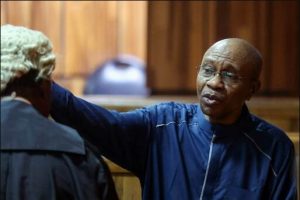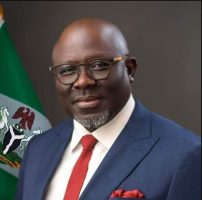The Lagos State Special Offences Court, Ikeja, presided over by Justice Rahman Oshodi will on Thursday, deliver a ruling on the admissibility of critical digital evidence presented by the Economic and Financial Crimes Commission, EFCC, in the ongoing trial of the immediate-past governor of the Central Bank of Nigeria, CBN, Godwin Emefiele.
It would be recalled that the former CBN helmsman is facing a 19-count charge of alleged fraud alongside his co-defendant, Henry Omoile, as slammed against them by the anti-graft agency.
Justice Oshodi arrived at the date after a fierce argument ensued between counsels involved in the case, over the authenticity and certification of documents extracted from a former Executive Assistant to the CBN Governor.
Before this development, the counsel for the EFCC, Rotimi Oyedepo, SAN, had continued with the testimony of Alvan Gurumnaan, an operative of the anti-graft agency, who detailed the digital trail uncovered during the investigation.
The evidence presented included WhatsApp conversations between key individuals in the case.
READ ALSO: Abia Airport: Displaced landowners allege fraud, injustice
In a significant revelation, the EFCC witness explained the acronym “PCS” found in the chats, stating that one “piece” was a code signifying a unit of N1,000.
Further analysis of the mobile phone of the former Executive Assistant, Mr. John Adetola, allegedly unveiled chats with a Mr. Eric Eboh, in which instructions were given to deliver $400,000 “for Oga.”
Gurumnaan testified that Adetola confirmed receiving and delivering the specified amount, adding that efforts to trace and interview the reportedly elusive Mr Eboh are ongoing.
While some documents dated February 2024 were admitted as evidence without objection, a bundle of subsequent documents extracted from Adetola’s phone met stiff resistance.
Defence counsels, led by Olalekan Ojo, SAN and Kazeem Gbadamosi, SAN, objected to their admissibility, citing concerns over a lack of proper certification as required under the Evidence Act.






